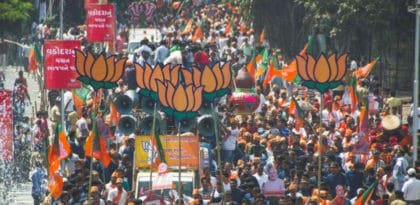UKIBC Roundtable – Anticipating India’s Elections
Despite being current favourite in the polls, PM Modi has far from a straight-forward path to re-election. His record holds him up as a man of action, but with five State elections between him and the General Election, the fight is very much on. Will his game-changing announcement on healthcare be enough? Read on through the summary of our 16th October London roundtable to find out more….

A Record in Power
At the last election in 2014 Modi stood on a platform of economic development across India with the youth vote very much in play.
Since then, much progress has been made. Every village has been electrified in at least a basic way by 2018, 91 million household and public toilets have been built, and 56.5 million connections to LPG (liquified petroleum gas) have been created for those from the poorest backgrounds.
On a macro-level Modi has been seen to secure 90% enrolment to the Aadhaar biometric card system, kept inflation at around 4%, GDP growth high and steady, and is heading in the right direction towards his target of India being in the top 50 places in the world for Ease of Doing Business.
Whilst not being able to directly create jobs for the hundreds of millions of young people in India, Modi’s approach has been focussed on efforts to empower young people to start up micro-businesses. This has manifested itself through major nation-wide schemes such as Start-Up India, Stand-Up India, and Mudra Loans (a small loans platform to set up businesses without collateral).
Despite critic’s concerns around Modi’s Hindu nationalist rhetoric, his policy outlawing the practice of triple talaq in divorce has, it has been argued, helped secure the BJP crucial support from Muslim women in the Uttar Pradesh State election.
There is a case to be made then that Mr Modi has improved circumstances for people from many walks of life across India.
The Five States of Play
How his record will be judged is up for contention across five State elections in November and December in a key test of Modi’s might going into the General Election expected to start in March/April 2019.
This time, five years ago, Modi’s BJP contended the same States and swept Rajasthan, Chhattisgarh, and Madhya Pradesh with Congress retaining a comfortable majority in Mizoram, and Telangana held by the Telangana Rashtra Samithi party.
Across the three States BJP won they took over 70% of the seats, leaving them little room to improve and potentially exposed to anti-incumbency effects this time round. The BJP are expected to lose in Rajasthan where there is a pattern of voters switching government every five years. Both Madhya Pradesh and Chhattisgarh are expected to be competitive and what could prove fascinating and decisive in who forms the Governments in these two states is the BJP’s ability to form alliances with other parties.
Whilst not expected to win in Telangana or Mizoram, the BJP do expect to see an increase in their vote share. As ever, key to winning State elections that general election is winning the rural vote which Modi has been strongly wooing both in his 2018 national budget and his potentially game-changing policy announcements.
Electoral Game Changers
For the last two years Modi has stated he plans to double farmers’ incomes by 2022. This is a bold move by Modi to win over the agricultural vote. A game-changer here could be Modi’s recent announcement of the Ayushman Bharat Yojana scheme – the world’s largest healthcare insurance scheme designed to cover the lowest income 40% of the Indian population. This has the potential to make major difference to the health and security of India’s largely poor agricultural workers accounting for roughly half of the nation’s workforce.
Not only this, but according to Government estimates, more than 60% of the average family’s spending goes on medicines and healthcare in India. Quickly dubbed ‘Modicare’ by his supporters, the policy is designed to improve the purchasing power of the average voter and could be a game changer in both State and General Elections.
With results due to be announced across all five States on 11th December, UKIBC will be gearing up to provide UK businesses with the insight they need on the Indian Elections. On the 22nd November we will be hosting a seminar for our members on what a second Modi term will mean for business and, in the new year, will be looking to explore what a post-election, post-Brexit horizon could mean for UK-India relations. For more on the UKIBC India Elections series, check out the summary from our previous 24th September roundtable here.






